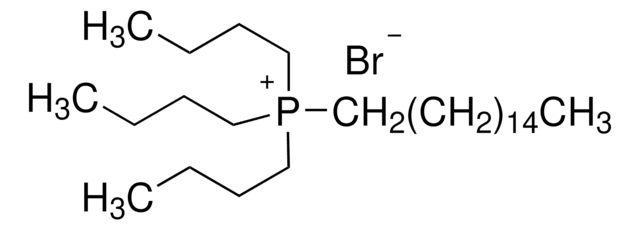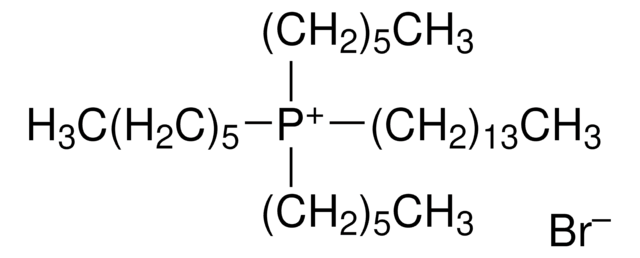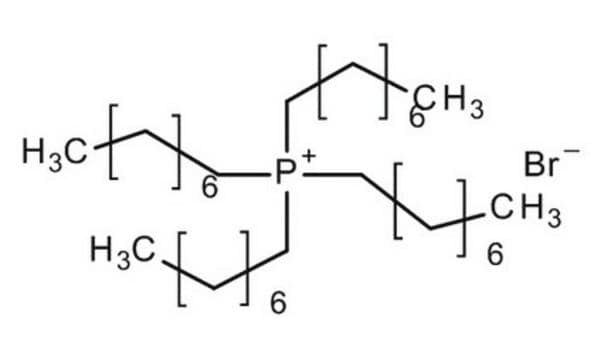189138
Bromure de tétrabutylphosphonium
98%
Synonyme(s) :
Tetra-n-butylphosphonium bromide
About This Item
Produits recommandés
Niveau de qualité
Pureté
98%
Forme
solid
Caractéristiques du produit alternatif plus écologique
Catalysis
Learn more about the Principles of Green Chemistry.
sustainability
Greener Alternative Product
Pf
100-103 °C (lit.)
Autre catégorie plus écologique
, Aligned
Chaîne SMILES
[Br-].CCCC[P+](CCCC)(CCCC)CCCC
InChI
1S/C16H36P.BrH/c1-5-9-13-17(14-10-6-2,15-11-7-3)16-12-8-4;/h5-16H2,1-4H3;1H/q+1;/p-1
Clé InChI
RKHXQBLJXBGEKF-UHFFFAOYSA-M
Vous recherchez des produits similaires ? Visite Guide de comparaison des produits
Catégories apparentées
Description générale
Application
- As a medium to disperse ruthenium catalyst for the synthesis of ethylene glycol from synthesis gas via ruthenium melt catalysis.
- As a catalyst supported on silica or alumina for the halogen exchange reaction to synthesize alkyl bromide from alkyl chloride.
- To synthesize various ionic liquids on mixing with different proportions of 1,3-dimethylurea for capturing NO gas.
- As a hydrogen-bond acceptor along with levulinic acid as a hydrogen-bond donor for the preparation of deep eutectic solvents to separate toluene from toluene/n-hexane mixtures.
- To prepare ionic semiclathrate hydrates.
Mention d'avertissement
Danger
Mentions de danger
Classification des risques
Acute Tox. 3 Dermal - Acute Tox. 4 Oral - Aquatic Chronic 2 - Eye Dam. 1 - Met. Corr. 1 - Repr. 2 - Skin Sens. 1B
Code de la classe de stockage
6.1C - Combustible acute toxic Cat.3 / toxic compounds or compounds which causing chronic effects
Classe de danger pour l'eau (WGK)
WGK 1
Point d'éclair (°F)
554.0 °F - closed cup
Point d'éclair (°C)
290 °C - closed cup
Équipement de protection individuelle
dust mask type N95 (US), Eyeshields, Faceshields, Gloves, type P3 (EN 143) respirator cartridges
Faites votre choix parmi les versions les plus récentes :
Déjà en possession de ce produit ?
Retrouvez la documentation relative aux produits que vous avez récemment achetés dans la Bibliothèque de documents.
Notre équipe de scientifiques dispose d'une expérience dans tous les secteurs de la recherche, notamment en sciences de la vie, science des matériaux, synthèse chimique, chromatographie, analyse et dans de nombreux autres domaines..
Contacter notre Service technique












